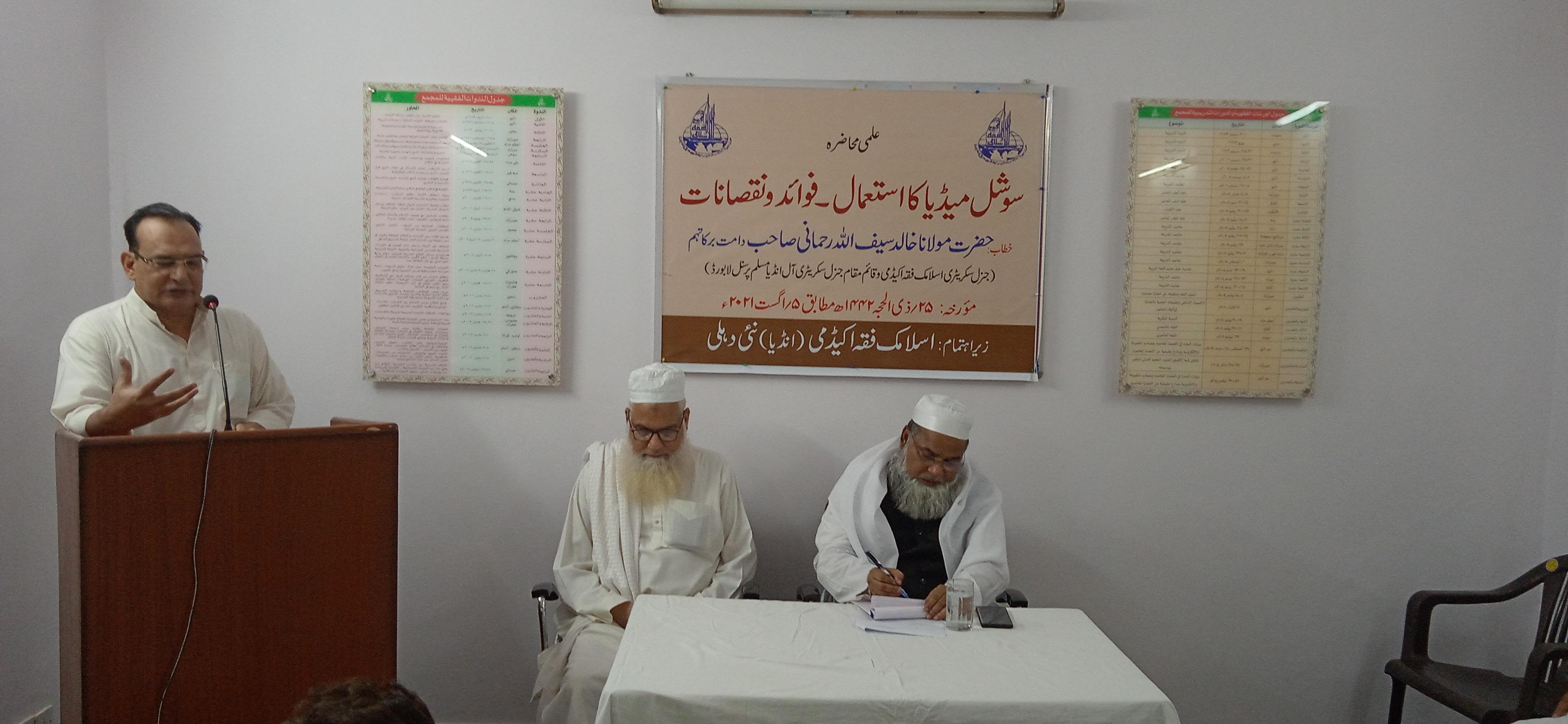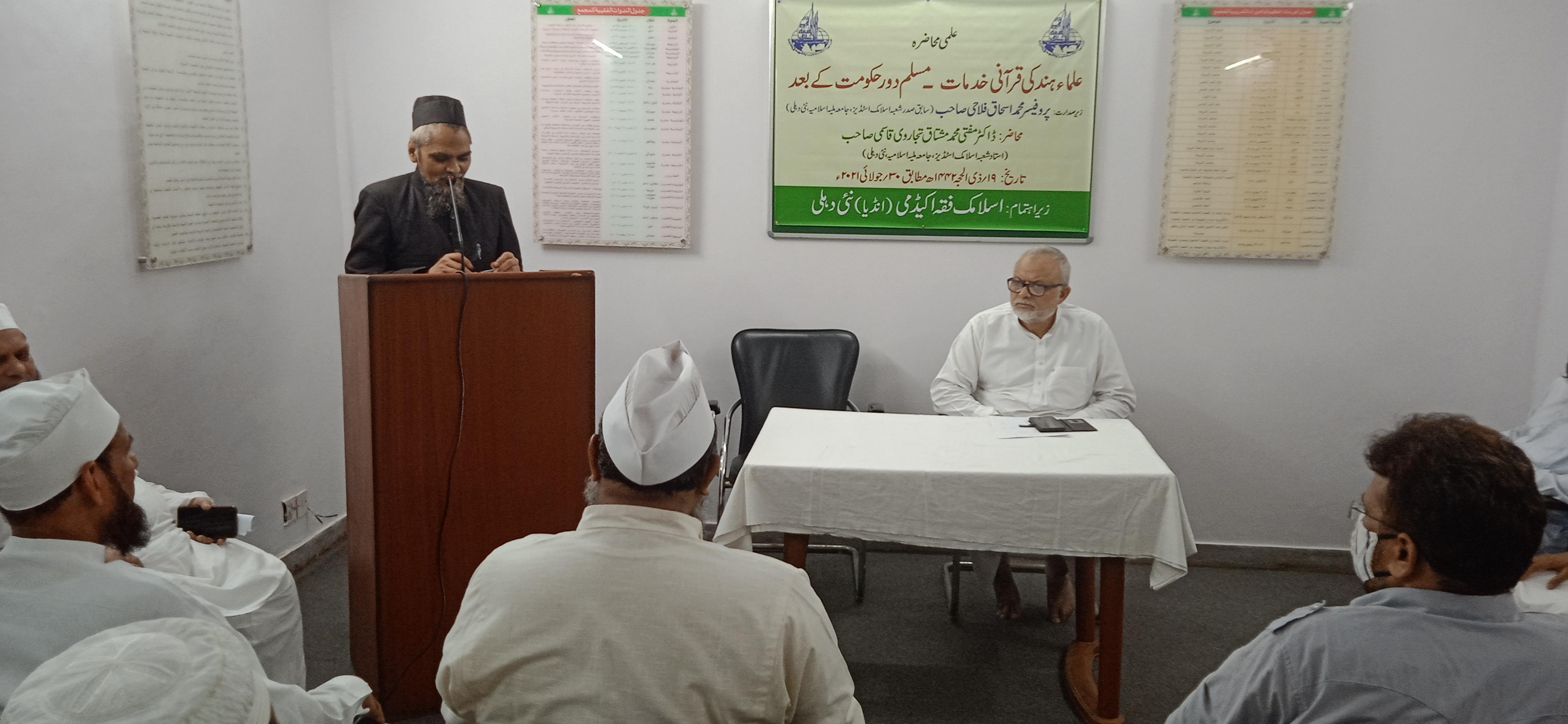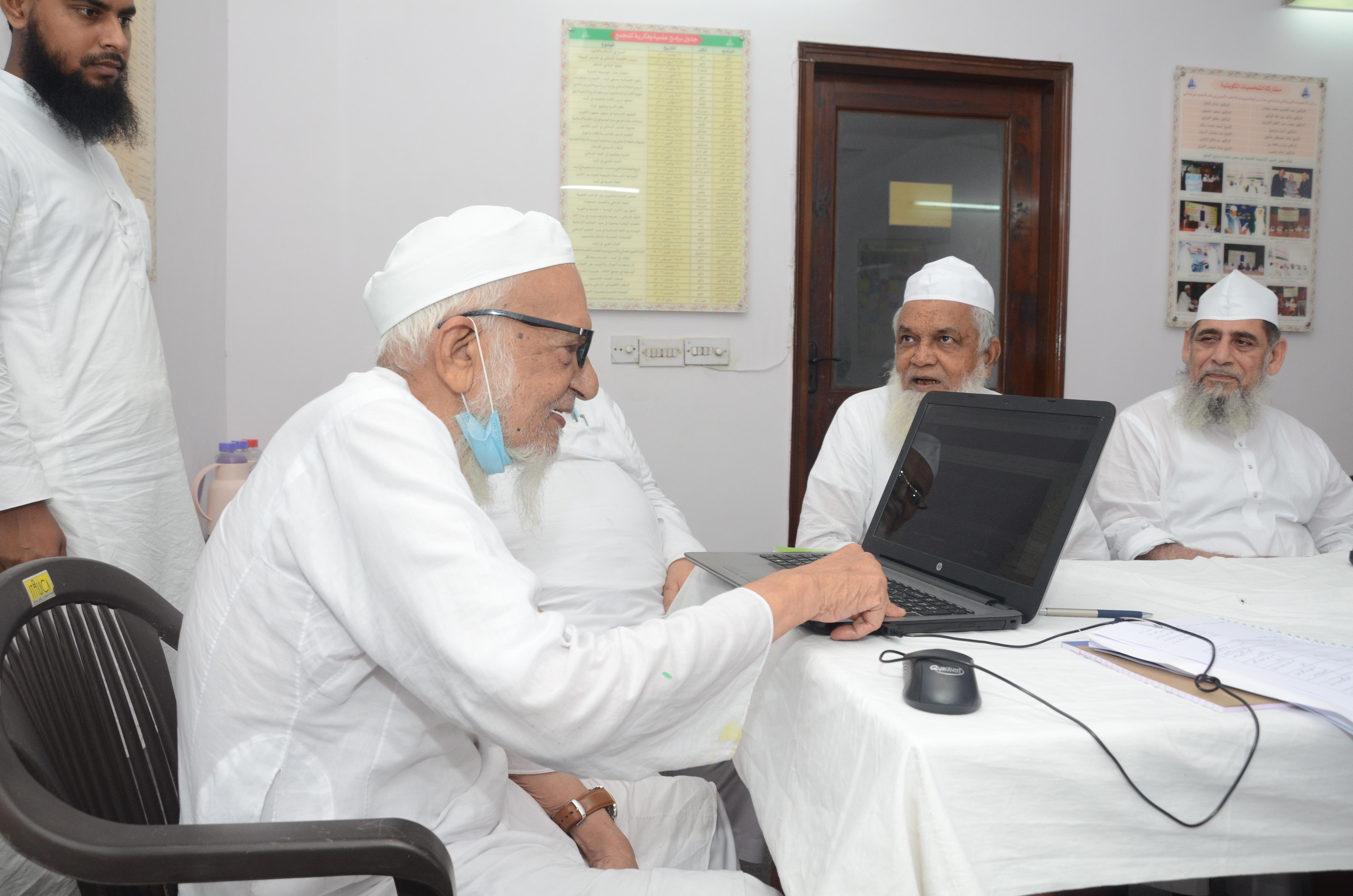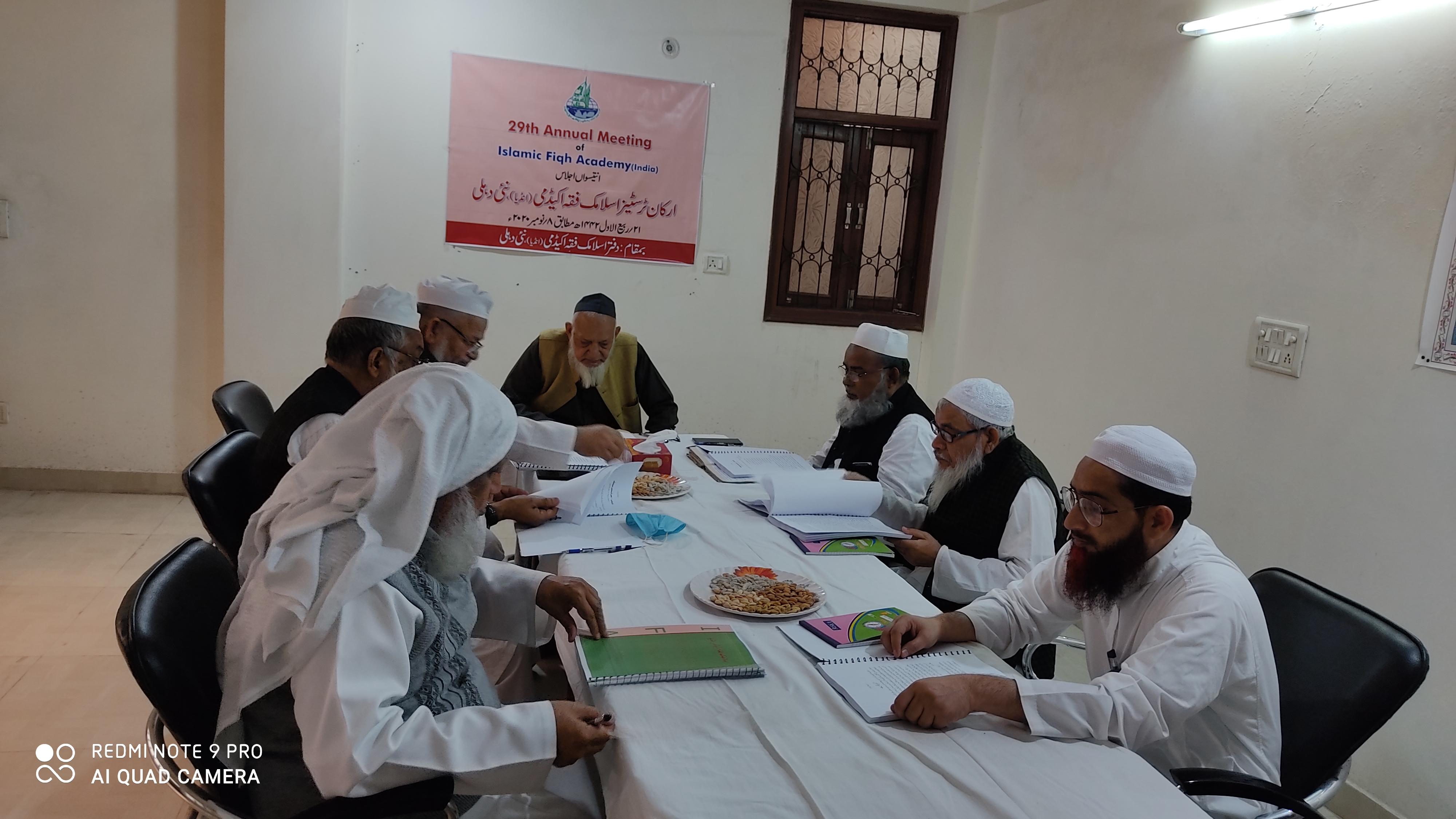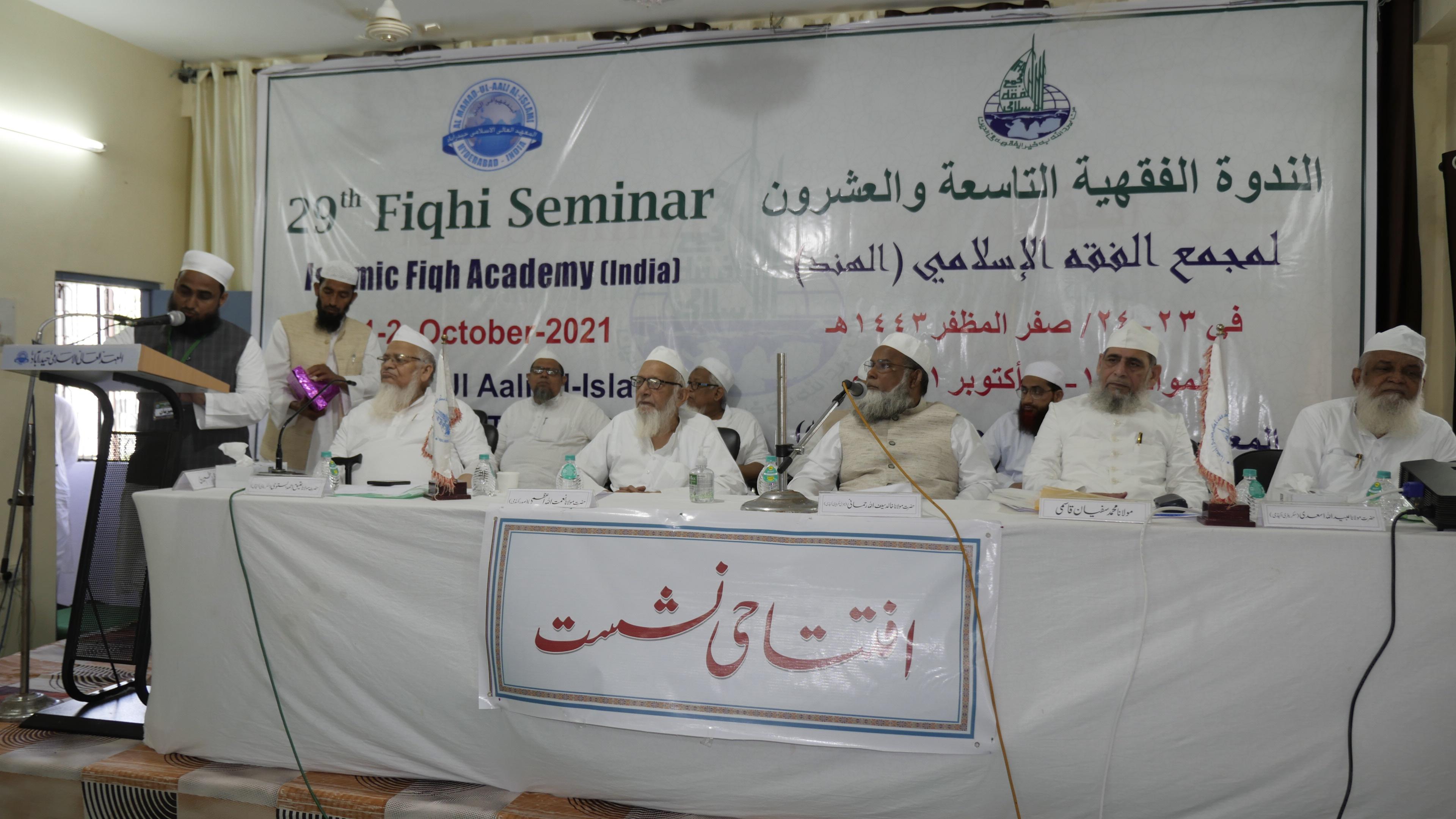
29/30 Fiqhi SeminarAl-Mahadul Aali Al-Islami, Hyderabad, 1-4 October 202
Press Release:
Suggestions and resolutions passed during the 29th and 30th
fiqhi seminars of Islamic Fiqh Academy (India)
The 29th and 30th
seminars of the Islamic Fiqh Academy (India) were jointly held from 1st
to 4th of October 2021 in Al-Madaul Aali Al Islami Hyderbad. The 29th
seminar was scheduled to be held by the end of 2019 but due to some reasons it
could not be possible to arrange the program in the year 2019 and then it was impeded
by the pandemic in 2020 as well. It was therefore decided to jointly organize
both the seminars.
The seminars jointly comprised a
total of eight sessions including two opening and two concluding sessions. The
opening sessions began on 2nd of October 2021 in the morning in
which Maulana Syed Rabey Hasani Nadvi (online), Maulana Nematullah Qasmi,
Maulana Khalid Saifullah Rahmani, Maulana Ateeq Ahmad Bastavi, Maulana
Ubaidullah Bastavi among over a hundred
prominent scholars from different institutions across the country were present.
The 39the seminar covered four
topics while the 30th one was dedicated for discussing two topics
and the following suggestions were unanimously offered:
Suggestion re a woman’s journey without a mahram (Islamically
unmarriageable male relative)
It was an important topic for deliberation in
the 39th seminar. In light of the papers received, the question
thrown and the discussions held, the following resolutions were passed:
1. A woman going out for a
journey is required to do so accompanying a mahram due to the risk involved.
And it makes no difference whether it is a long journey or a short one. It will
therefore be impermissible for her to travel without a mahram even if it is to a
distance shorter than what makes it a Shar’i journey when it is risky. The
ruling about concession in the Salah will however rely on a distance recognized
by the Shari’ah for the same.
2. A woman should generally avoid
going out on a Shar’i journey alone even if there is no imminent risk to her
safety. However, if she must and it is not possible for her to take her husband
or a mahram along with her then it would be permissible for her to travel alone
in an apparently safe environment.
3. As a journey for Hajj or Umrah
takes days during which a woman often needs a man’s help, it will not be
permissible for her to travel in the company of reliable women only. The same
applies to the case of an elderly lady as she might be more in need of help
from a man.
4. It is not permissible for a woman
having no mahram or incapable of bearing the cost of accompanying a mahram to
travel with the group organized by a Hajj committee or a Hajj tour agency.
5. With respect to clause 3 and 4,
it should be borne in mind that this prohibition is based on the principles of
Hanafi Fiqh. The followers of other schools that allow women to go for Hajj in
the company of a women only group may act accordingly.
Besides discussing emerging
issues, Islamic Fiqh Academy also brings forth some principles of Islamic
jurisprudence for deliberation so that the rising issues can be accurately
judged. An important topic for discussion in the seminar was about the
principle called sadd-i zari’ah literally blocking the means. In the light of
the papers presented and the discussion followed the following suggestions were
put forth in this regard:
1. Prohibition of things
permissible in themselves due to leading to something impermissible is called
sadd-i zari’ah
2. Sadd-i zari’ah is recognized
in the Shari’ah and a number of rulings are based on it.
3. Adopting the means that
definitely or most probably lead to something prohibited is unanimously
impermissible.
4. The means that most likely do not
lead to something prohibited but often do should also be avoided.
5. Means that rarely lead to a
sin are deemed permissible in the Shari’ah.
6. This principle plays a key
role in a number of contemporary issues and the Ulama may employ it to
understand such issues, for example:
a. Prohibition of organized
tawarruq
b. Prohibition of using android
mobile, DVT and VCR etc for watching pornography.
Suggestion re some important issues related to moon-sighting
1. The horizon where the moon is
sighted on the first day is called matla. Matla for all the places where the
crescent is usually sighted on the same day is considered one in Islam while
two such places of which one sees the moon one day before or after the other
are considered to differ in the matla.
If moon is sighted in an area
among the areas sharing the same matla, the Muslims in the other parts of the
country should wait for an announcement by their local Qazi or the Hilal
committee. The local Qazi and the Hilal committee should however make sure that
all the Islamically legal requirements are met before the announcement.
3. There is nothing wrong if one
consults the experts in astronomy and meteorology to know if observation of the
crescent by sight is possible or whether the sky will be clear or not. The moon-sighting
is determined by observation by sight only and not by astronomical calculations.
4. If astronomical calculations
suggest impossibility of observation by sight then extra care should be taken
while accepting testimonies.
5. An unclear matla is when there
is something in the sky that disturbs observing the moon by sight such as clouds,
dust, environmental pollution etc.
6. If the matla is clear then the
moon should be sighted by a considerable number of people, be it of Ramadan or
of either of the two Eids.
7. To accept testimony of moon-sighting
from a person, it is enough that the individual is not considered a liar in
his/her society and is not an infamous offender.
8. A person who has observed the
moon should go to register his testimony to the Qazi or to the Hilal committee
depending on who decides as taking care to sight the soon and registering one’s
testimony is also a virtuous deed.
9. If no testimony is yet
received by the Qazi or the Hilal committee then whoever has seen it must
immediately go to give testimony. Any delay will be inexcusable.
10. Where the moon-sighting is
determined by a Qazi or the Hilal Committee, an announcement by the same
authority will be binding on the people of the area. It will however not be
binding on people of the other areas unless a local authority makes the
announcement.
11. If an announcement is
broadcast through radio, television or other information media citing the exact
wording of the respective Qazi or that of the Hilal committee it will be
Islamically valid and binding no matter who makes the announcement.
12. People in countries that
usually have an unclear sky should rely on sighting of a neighboring country
where the sky is usually clear instead of resorting to astronomical
calculations.
13. If the moon-sighting is
determined in several states of a country and the news reaches to other states
with such reliable means that changes of it being a fake news are slim then the
Qazis and Hilal committees of other states may decided accepting it as a
widespread news (istifaza).
14. In case of no mass sighting
or no sighting at all in a certain state or city while the sighting has been
proved in neighboring regions, the Qazi or the Hilal committee will have the
right to announce. If the place has no Qazi or Hilal committee then an alim and
mufti whom people consult for their religious affairs will have this right. An
announcement made by unauthorized people will not be considered.
15. If people break their fasts
following an announcement by an unauthorized individual/entity then only qaza
will be obligatory
16. Ideally there should be one
united Hilal committee in a city or state. However, if there are more ,they
should work in collaboration so as to save the Ummah from disunity and
confusion.
17. The seminar requests all the Ulama
and religious institutions to form a committee that will consult all the Hilal
committees and the institutions that care for moon-sighting and after
determination in light of the Shar’i principles make a united announcement. The committee must have representatives from
all the Islamic schools of thought to save people from the confusion they
face.
18. The seminar strongly
recommends that astronomy should be included in the madrasa syllabus as a
compulsory subject again.
Suggestion re buying and selling of fruits in the orchards
1. Selling the fruits of an
orchard for one, two or more years in advance is called Bay’ al-Mu’awamah and
Bay’ al-Sinin. The Messenger of Allah (S) has reportedly prohibited it.
2. If fruits have not yet
appeared on the trees then it is invalid to sell them.
3. If fruits have appeared on the
trees then it is valid to sell them.
4. If trees have blossomed then
it is also valid to sell them.
5. If fruits have appeared on
most of the tress then it is valid to sell all the fruits.
6. In clause 3, 4 and 5, if both
parties agree to leave the fruits till they ripen, they will be halal for the
buyer.
7. Ijarah of trees without the
field is invalid.
8. It is however valid if one
takes the field along with its trees on lease.
9. With respect to sale of
orchards, one should wait for the fruits to ripen before selling.
Suggestion re some important issues arising from Corona
Corona has impacted all walks of
life including performance of certain forms of worship for the believers. To
count a few:
1. In view of the restrictions
imposed due to the pandemic, it is allowed to organize multiple congregations
for the five daily prayers as well as the Jumu’ah and the two Eid prayers. Care should be taken that each congregation
has a different imam and a different arrangement than the previous one.
2. In normal circumstance, if a
masjid falls short of incommoding the growing number of worshippers and it is
not feasible to make prayer rows outside then Salah may be performed in
multiple congregations till expansion of the Masjid or construction of a new
one.
3. In view of the pandemic
restrictions, it would be allowed to pray Jumu’ah at different places beside
the one held in the Masjid. Maulana
Muhammad Mustafa Abdul Quddus however disagrees.
4. People willing to offer Zohr
at home due to the pandemic may do so in congregation as well as individually.
5. If bathing or performing tayammum
is unfeasible for a dead due to the Corona restrictions then the obligation is
dropped and it will be valid to perform Janazah without it.
6. If it is unfeasible to shroud
a person who died due to Corona virus according to the Prophetic tradition then
his cover should be wrapped according to the tradition if possible. However, if
that is also not feasible then the cover will be considered his Kafan.
7. If a person who died due to
Corona virus is buried without performing Janazah for him then the prayer can
be performed at his grave as long his dead body is supposed to be intact.
The Shari’ah rules and regulations for using social media
In the 30th seminar of
the Academy held on 3rd and 4th of October 2021 an
important topic “The Shari’ah rules and regulations for using social media” was
thrown for discussion and the following resolutions were passed:
1. Social media is an important innovation of
this time with both positive and negative sides.
2. Forwarding verified religious
and informative things is permissible.
3. A thing is judged in view of
the purpose sought from it. Therefore, working with a site that promotes
pornography will therefore be impermissible.
4. Propagating social media
contents that mock moral values and promote irreligious and deviant thoughts is
not permissible except that the person the material is forwarded to is expected
to refute them.
5. It is permissible to use
mobile and social media for educational purposes. However, the user should stay
away from things that may harm him or her physically or spiritually.
6. Social media can be used for
communicating the message of Islam, learning Islamic and moral values and
Islamically legal commercial purposes.
7. The recommendation committee
requests the academy to form a sub-committee for scrutinizing the online
activities related to the Darul Qaza and preparing a detailed report.
8. Listening an audio or watching a video with
Islamically legal contents is valid and similarly if a company pays for
forwarding such audios or videos the money will be legal.
9. Deliberate inclusion of
illegal or unverified ads for promoting your videos is not valid.
10. Online games are considered
bad for several reasons and therefore it is not valid to play them or make them
a means of income. However, if they are free from gambling, wasting time and
money and immoral contents then one may play and win prices.
11. It is not Islamically valid
to add someone to any social media group without prior explicit or implicit
permission.
12. It is not allowed to make
pdfs of the books whose rights are reserved for their authors or publishers or
to make digital copies of them by converting to any other format for sharing on
social media without permission.
13. While using social media one
should follow the Islamic and moral values and should avoid all irreligious and
immoral things.
14. A number of sites created by
the deviant sects can be detected on social media. This seminar advises the
youth to stay away from such sites and consult the reliable scholars if there
is any doubt whatsoever.

